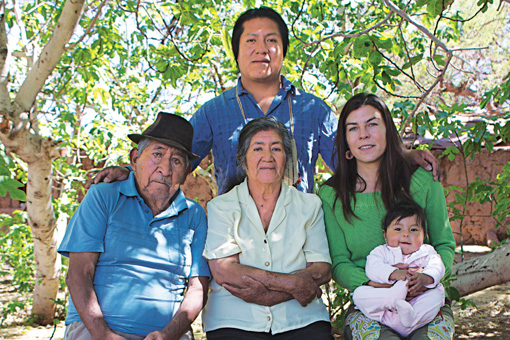Rolando Humire Coca, the political representative of approximately 4,000 Indigenous atacameño people in Chile, is a busy man. The 32-year-old biochemist (and beer brewer) serves as president of three local organizations, including the Consejo de los Pueblos Atacameños—a political body of 17 local Indigenous communities known as ayllus.
Humire’s activism was fueled by his achievements as a scientist. He left his Indigenous community in Atacama at the age of 19 to study biochemistry at the University of Chile in Santiago, where he conducted genetic research on strawberries to see how they could be adapted to grow in the desert. He welcomed the opportunity to learn how to succeed in a Western culture, which gave him the chance, as he put it, to “see life from two points of view.”
But when he came back to Atacama, Humire was struck by the gulf between his home and Santiago, which he attributes to corrupt local leaders and government policies that “keep Indians in ignorance and segregation.” Motivated to run for election as president of his local ayllu, he was elected president of all 17 atacameño communities in early 2013.
Humire’s greatest challenge as a community leader—and one of his most cherished dreams—is to diminish the education gap in Atacama. “To come to the University of Chile was a bridge—but you can’t get a good education in Atacama, Antofagasta or Copiapó,” he says.
That’s why Humire hopes to develop a contract between the University of Chile and the pueblos atacameños (atacameño people) to create “a university in the desert” that would bring high-quality education to his community. He’s also in talks with a local mining company to secure their investment in high school education for rural children. Although Humire concedes that mining firms have traditionally provided little help to his community, he hopes to persuade them through examples overseas—such as Canada and Australia, which have provided funds to develop Indigenous companies and industries. A veteran of multiple dialogues and roundtables with mining companies to “recover trust,” Humire says companies could significantly improve community relations by supporting local economic autonomy.
As part of Humire’s drive to expand educational opportunities for young atacameños, he has taught biology classes at an elementary school in Toconao, is securing funding for a boarding house for 55 rural kids to attend high school in Calama, and has negotiated university scholarships for five promising young students, with hopes for more. He also wants to train local youth to run the proposed $20 billion reconstructed Museo Arqueólogico R.P. Gustavo Le Paige, which features a major collection of Indigenous atacameño artifacts.
Humire sees himself as a role model for children in the community. “They can see that you are a scientist in their classroom—and you can look like them and think like them,” he says. “There is so much talent and richness [here] in terms of human capacity that must be guided and supported.”
Raised by his mother, aunt and grandmother, Humire owes his college education to the women in his family, who pooled their resources to pay his tuition. Proceeds from the family properties in San Pedro de Atacama—an ecotourism mecca in northern Chile—also gave him the opportunity to learn English and French. He credits his wife, Claudia, with whom he has a 20-month-old daughter, for his continued success. “She’s so understanding that I make so much effort and I get [paid] nothing,” he says.
Meanwhile, Humire is continuing his own scientific work. He’s working on a PhD in ecosystem management, and plans to start a scientific research company run by Indigenous people that studies the properties of medicinal plants and the geological features of the desert, like geysers and salt lakes, to better manage the fragile environment. “Instead of producing raw material, I want to produce knowledge,” he says.
And then there’s beer. He recently signed a contract with the E Sun Festival to produce and sell 10,000 liters of his line of craft beers (which incorporate local medicinal herbs) at the festival. “I use what I learned in biochemistry to brew beer,” he explains.
Humire hopes his unique combination of skills will inspire other people in his community. “If people see that someone like them is doing something new, they will believe in themselves,” he says.





